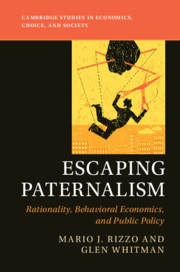Book contents
- Escaping Paternalism
- Cambridge Studies in Economics, Choice, and Society
- Escaping Paternalism
- Copyright page
- Contents
- Figures
- Tables
- Preface
- 1 Introduction
- 2 What Is Rationality?
- 3 Rationality for Puppets
- 4 Preference Biases
- 5 The Rationality of Beliefs
- 6 Deficient Foundations for Behavioral Policymaking
- 7 Knowledge Problems in Paternalist Policymaking
- 8 The Political Economy of Paternalist Policymaking
- 9 Slippery Slopes in Paternalist Policymaking
- 10 Common Threads, Escape Routes, and Paths Forward
- References
- Index
3 - Rationality for Puppets
Published online by Cambridge University Press: 02 December 2019
- Escaping Paternalism
- Cambridge Studies in Economics, Choice, and Society
- Escaping Paternalism
- Copyright page
- Contents
- Figures
- Tables
- Preface
- 1 Introduction
- 2 What Is Rationality?
- 3 Rationality for Puppets
- 4 Preference Biases
- 5 The Rationality of Beliefs
- 6 Deficient Foundations for Behavioral Policymaking
- 7 Knowledge Problems in Paternalist Policymaking
- 8 The Political Economy of Paternalist Policymaking
- 9 Slippery Slopes in Paternalist Policymaking
- 10 Common Threads, Escape Routes, and Paths Forward
- References
- Index
Summary
Behavioral paternalists accept the neoclassical standard of rationality for normative purposes, even while questioning its descriptive accuracy. However, these standards do not have a strong normative justification. There are many perfectly reasonable ways the neoclassical norms can be violated without hurting the interests of individuals. Redescribing preferences or actions to fit the well-behaved mold is essentially arbitrary and without, in itself, any normative significance. Even demonstrating that individuals have inconsistent preferences does not tell us which preferences are better or represent “true preferences.” Behavioral paternalists commit a non sequitur when they use inconsistency to justify privileging some preferences over others.
Keywords
- Type
- Chapter
- Information
- Escaping PaternalismRationality, Behavioral Economics, and Public Policy, pp. 39 - 90Publisher: Cambridge University PressPrint publication year: 2019

